Exploring Medical Social Work in Palliative Care: A Detailed Review
VerifiedAdded on 2022/11/18
|5
|934
|442
Essay
AI Summary
This paper provides a concise overview of the scope of practice and application of professional duties for medical social workers in palliative care settings, emphasizing their responsibilities in addressing the health requirements of patients and their families. It highlights key functions such as psychosocial assessments, care coordination, counseling, and crisis intervention. The paper further discusses strategies beyond the typical scope of practice, including referrals, patient empowerment, and advocacy for financial assistance. Ultimately, it underscores the vital role of palliative care social workers in meeting the diverse health needs of both patients and their families during challenging times.
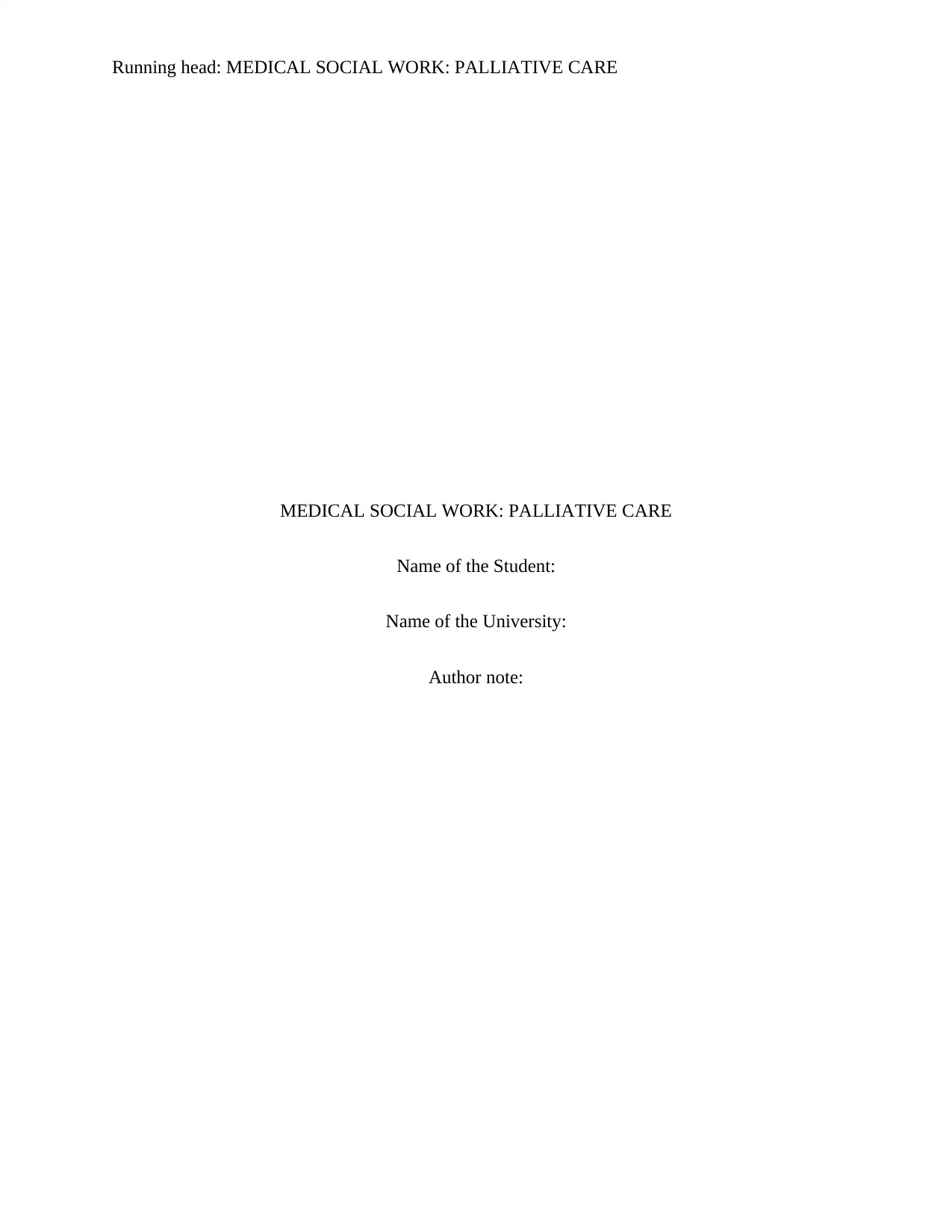
Running head: MEDICAL SOCIAL WORK: PALLIATIVE CARE
MEDICAL SOCIAL WORK: PALLIATIVE CARE
Name of the Student:
Name of the University:
Author note:
MEDICAL SOCIAL WORK: PALLIATIVE CARE
Name of the Student:
Name of the University:
Author note:
Paraphrase This Document
Need a fresh take? Get an instant paraphrase of this document with our AI Paraphraser
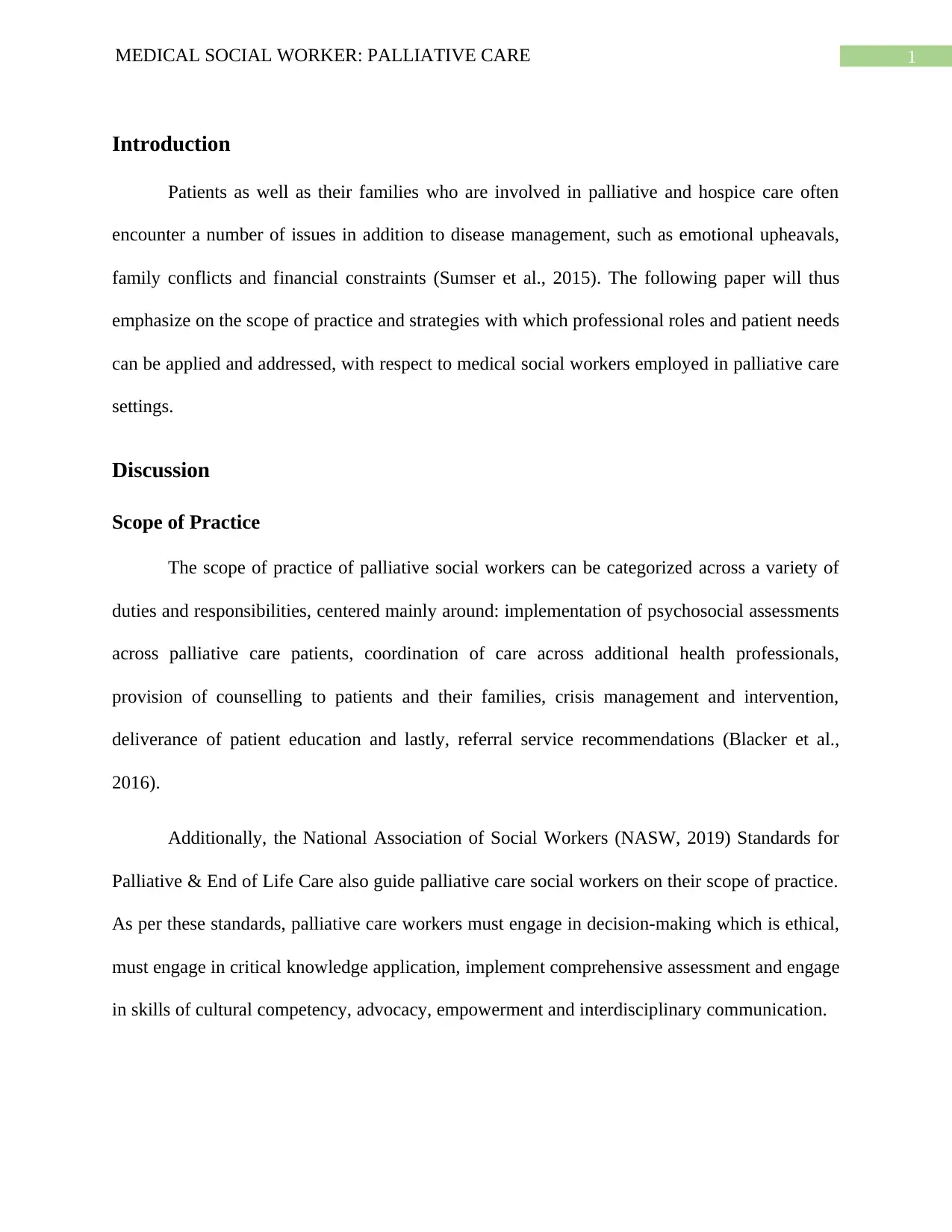
1MEDICAL SOCIAL WORKER: PALLIATIVE CARE
Introduction
Patients as well as their families who are involved in palliative and hospice care often
encounter a number of issues in addition to disease management, such as emotional upheavals,
family conflicts and financial constraints (Sumser et al., 2015). The following paper will thus
emphasize on the scope of practice and strategies with which professional roles and patient needs
can be applied and addressed, with respect to medical social workers employed in palliative care
settings.
Discussion
Scope of Practice
The scope of practice of palliative social workers can be categorized across a variety of
duties and responsibilities, centered mainly around: implementation of psychosocial assessments
across palliative care patients, coordination of care across additional health professionals,
provision of counselling to patients and their families, crisis management and intervention,
deliverance of patient education and lastly, referral service recommendations (Blacker et al.,
2016).
Additionally, the National Association of Social Workers (NASW, 2019) Standards for
Palliative & End of Life Care also guide palliative care social workers on their scope of practice.
As per these standards, palliative care workers must engage in decision-making which is ethical,
must engage in critical knowledge application, implement comprehensive assessment and engage
in skills of cultural competency, advocacy, empowerment and interdisciplinary communication.
Introduction
Patients as well as their families who are involved in palliative and hospice care often
encounter a number of issues in addition to disease management, such as emotional upheavals,
family conflicts and financial constraints (Sumser et al., 2015). The following paper will thus
emphasize on the scope of practice and strategies with which professional roles and patient needs
can be applied and addressed, with respect to medical social workers employed in palliative care
settings.
Discussion
Scope of Practice
The scope of practice of palliative social workers can be categorized across a variety of
duties and responsibilities, centered mainly around: implementation of psychosocial assessments
across palliative care patients, coordination of care across additional health professionals,
provision of counselling to patients and their families, crisis management and intervention,
deliverance of patient education and lastly, referral service recommendations (Blacker et al.,
2016).
Additionally, the National Association of Social Workers (NASW, 2019) Standards for
Palliative & End of Life Care also guide palliative care social workers on their scope of practice.
As per these standards, palliative care workers must engage in decision-making which is ethical,
must engage in critical knowledge application, implement comprehensive assessment and engage
in skills of cultural competency, advocacy, empowerment and interdisciplinary communication.
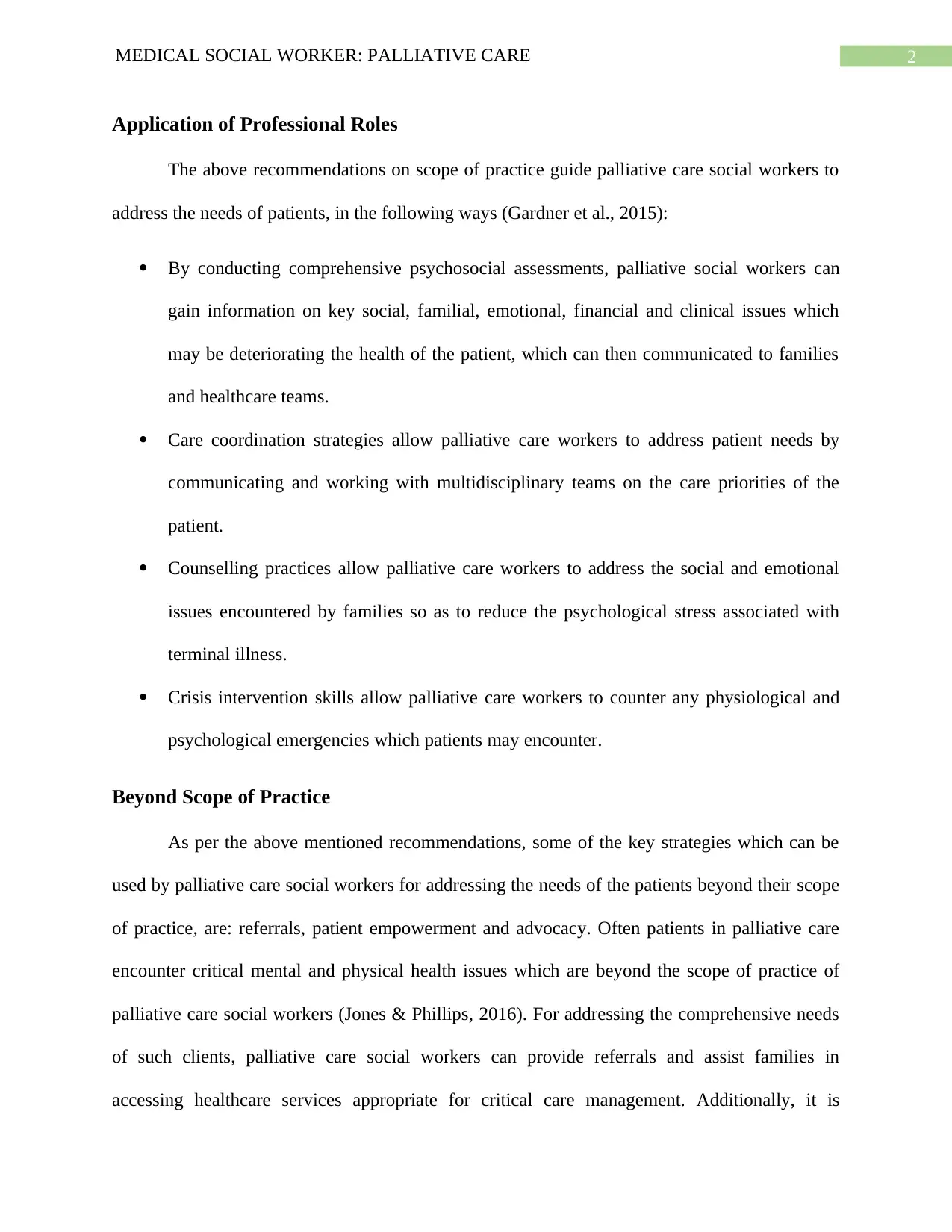
2MEDICAL SOCIAL WORKER: PALLIATIVE CARE
Application of Professional Roles
The above recommendations on scope of practice guide palliative care social workers to
address the needs of patients, in the following ways (Gardner et al., 2015):
By conducting comprehensive psychosocial assessments, palliative social workers can
gain information on key social, familial, emotional, financial and clinical issues which
may be deteriorating the health of the patient, which can then communicated to families
and healthcare teams.
Care coordination strategies allow palliative care workers to address patient needs by
communicating and working with multidisciplinary teams on the care priorities of the
patient.
Counselling practices allow palliative care workers to address the social and emotional
issues encountered by families so as to reduce the psychological stress associated with
terminal illness.
Crisis intervention skills allow palliative care workers to counter any physiological and
psychological emergencies which patients may encounter.
Beyond Scope of Practice
As per the above mentioned recommendations, some of the key strategies which can be
used by palliative care social workers for addressing the needs of the patients beyond their scope
of practice, are: referrals, patient empowerment and advocacy. Often patients in palliative care
encounter critical mental and physical health issues which are beyond the scope of practice of
palliative care social workers (Jones & Phillips, 2016). For addressing the comprehensive needs
of such clients, palliative care social workers can provide referrals and assist families in
accessing healthcare services appropriate for critical care management. Additionally, it is
Application of Professional Roles
The above recommendations on scope of practice guide palliative care social workers to
address the needs of patients, in the following ways (Gardner et al., 2015):
By conducting comprehensive psychosocial assessments, palliative social workers can
gain information on key social, familial, emotional, financial and clinical issues which
may be deteriorating the health of the patient, which can then communicated to families
and healthcare teams.
Care coordination strategies allow palliative care workers to address patient needs by
communicating and working with multidisciplinary teams on the care priorities of the
patient.
Counselling practices allow palliative care workers to address the social and emotional
issues encountered by families so as to reduce the psychological stress associated with
terminal illness.
Crisis intervention skills allow palliative care workers to counter any physiological and
psychological emergencies which patients may encounter.
Beyond Scope of Practice
As per the above mentioned recommendations, some of the key strategies which can be
used by palliative care social workers for addressing the needs of the patients beyond their scope
of practice, are: referrals, patient empowerment and advocacy. Often patients in palliative care
encounter critical mental and physical health issues which are beyond the scope of practice of
palliative care social workers (Jones & Phillips, 2016). For addressing the comprehensive needs
of such clients, palliative care social workers can provide referrals and assist families in
accessing healthcare services appropriate for critical care management. Additionally, it is
⊘ This is a preview!⊘
Do you want full access?
Subscribe today to unlock all pages.

Trusted by 1+ million students worldwide
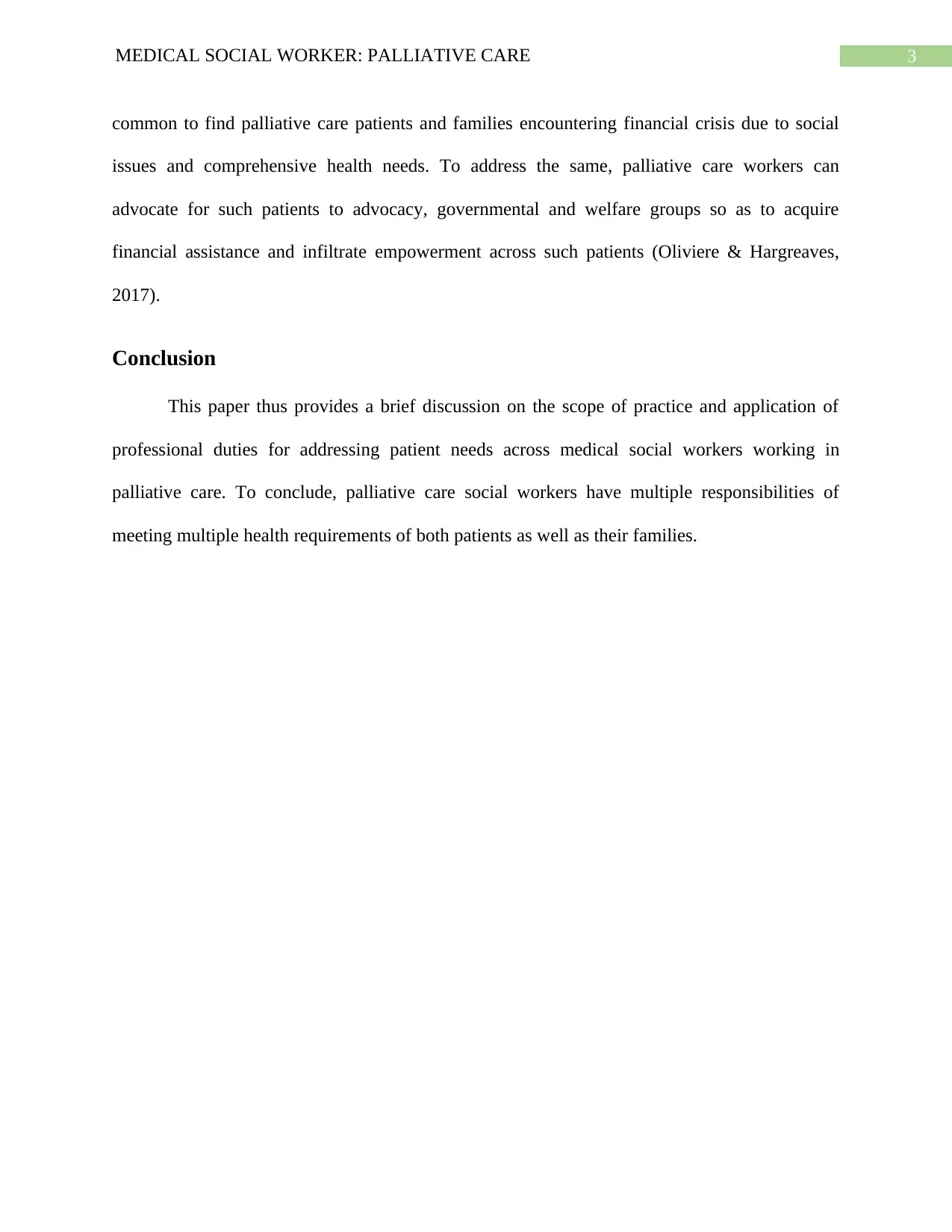
3MEDICAL SOCIAL WORKER: PALLIATIVE CARE
common to find palliative care patients and families encountering financial crisis due to social
issues and comprehensive health needs. To address the same, palliative care workers can
advocate for such patients to advocacy, governmental and welfare groups so as to acquire
financial assistance and infiltrate empowerment across such patients (Oliviere & Hargreaves,
2017).
Conclusion
This paper thus provides a brief discussion on the scope of practice and application of
professional duties for addressing patient needs across medical social workers working in
palliative care. To conclude, palliative care social workers have multiple responsibilities of
meeting multiple health requirements of both patients as well as their families.
common to find palliative care patients and families encountering financial crisis due to social
issues and comprehensive health needs. To address the same, palliative care workers can
advocate for such patients to advocacy, governmental and welfare groups so as to acquire
financial assistance and infiltrate empowerment across such patients (Oliviere & Hargreaves,
2017).
Conclusion
This paper thus provides a brief discussion on the scope of practice and application of
professional duties for addressing patient needs across medical social workers working in
palliative care. To conclude, palliative care social workers have multiple responsibilities of
meeting multiple health requirements of both patients as well as their families.
Paraphrase This Document
Need a fresh take? Get an instant paraphrase of this document with our AI Paraphraser
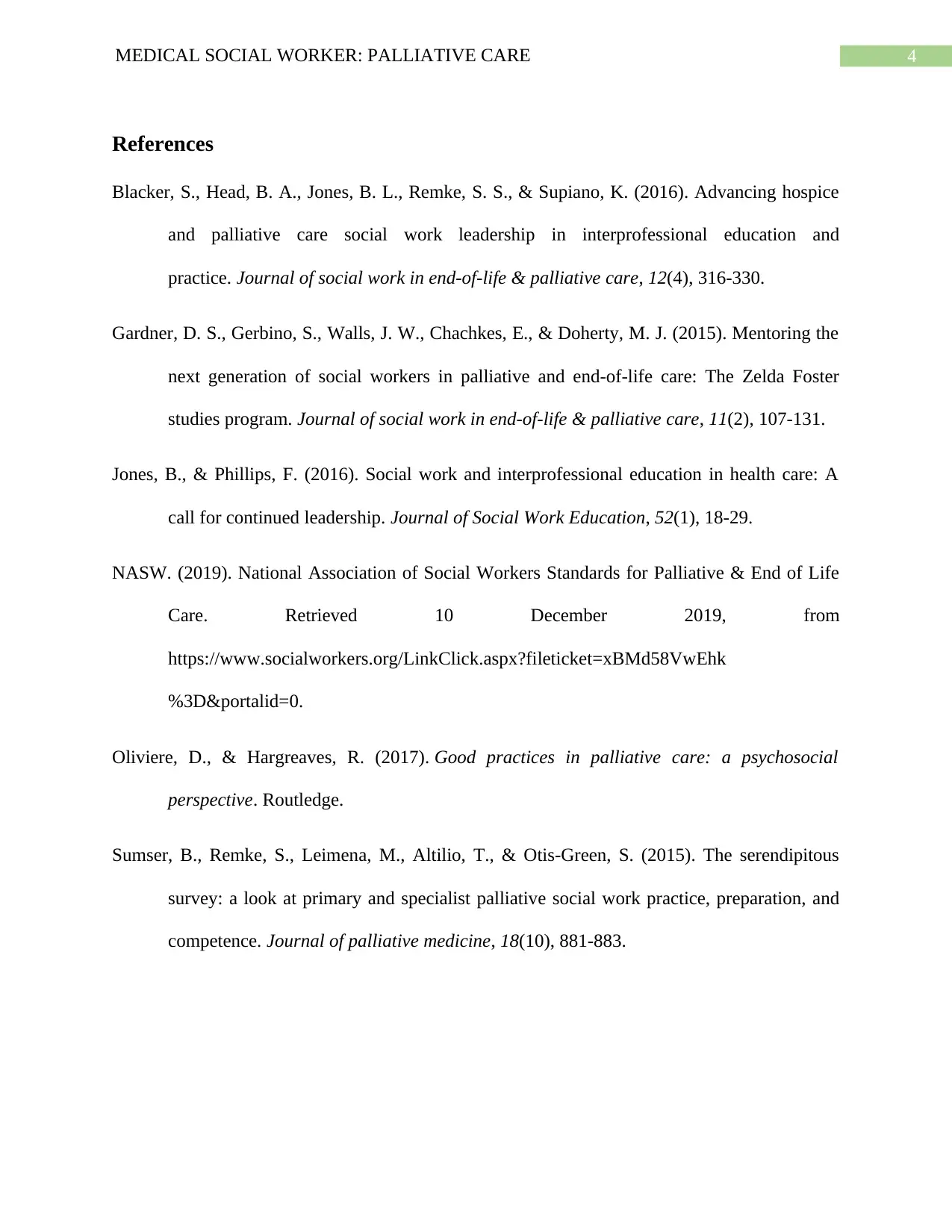
4MEDICAL SOCIAL WORKER: PALLIATIVE CARE
References
Blacker, S., Head, B. A., Jones, B. L., Remke, S. S., & Supiano, K. (2016). Advancing hospice
and palliative care social work leadership in interprofessional education and
practice. Journal of social work in end-of-life & palliative care, 12(4), 316-330.
Gardner, D. S., Gerbino, S., Walls, J. W., Chachkes, E., & Doherty, M. J. (2015). Mentoring the
next generation of social workers in palliative and end-of-life care: The Zelda Foster
studies program. Journal of social work in end-of-life & palliative care, 11(2), 107-131.
Jones, B., & Phillips, F. (2016). Social work and interprofessional education in health care: A
call for continued leadership. Journal of Social Work Education, 52(1), 18-29.
NASW. (2019). National Association of Social Workers Standards for Palliative & End of Life
Care. Retrieved 10 December 2019, from
https://www.socialworkers.org/LinkClick.aspx?fileticket=xBMd58VwEhk
%3D&portalid=0.
Oliviere, D., & Hargreaves, R. (2017). Good practices in palliative care: a psychosocial
perspective. Routledge.
Sumser, B., Remke, S., Leimena, M., Altilio, T., & Otis-Green, S. (2015). The serendipitous
survey: a look at primary and specialist palliative social work practice, preparation, and
competence. Journal of palliative medicine, 18(10), 881-883.
References
Blacker, S., Head, B. A., Jones, B. L., Remke, S. S., & Supiano, K. (2016). Advancing hospice
and palliative care social work leadership in interprofessional education and
practice. Journal of social work in end-of-life & palliative care, 12(4), 316-330.
Gardner, D. S., Gerbino, S., Walls, J. W., Chachkes, E., & Doherty, M. J. (2015). Mentoring the
next generation of social workers in palliative and end-of-life care: The Zelda Foster
studies program. Journal of social work in end-of-life & palliative care, 11(2), 107-131.
Jones, B., & Phillips, F. (2016). Social work and interprofessional education in health care: A
call for continued leadership. Journal of Social Work Education, 52(1), 18-29.
NASW. (2019). National Association of Social Workers Standards for Palliative & End of Life
Care. Retrieved 10 December 2019, from
https://www.socialworkers.org/LinkClick.aspx?fileticket=xBMd58VwEhk
%3D&portalid=0.
Oliviere, D., & Hargreaves, R. (2017). Good practices in palliative care: a psychosocial
perspective. Routledge.
Sumser, B., Remke, S., Leimena, M., Altilio, T., & Otis-Green, S. (2015). The serendipitous
survey: a look at primary and specialist palliative social work practice, preparation, and
competence. Journal of palliative medicine, 18(10), 881-883.
1 out of 5
Related Documents
Your All-in-One AI-Powered Toolkit for Academic Success.
+13062052269
info@desklib.com
Available 24*7 on WhatsApp / Email
![[object Object]](/_next/static/media/star-bottom.7253800d.svg)
Unlock your academic potential
Copyright © 2020–2026 A2Z Services. All Rights Reserved. Developed and managed by ZUCOL.





